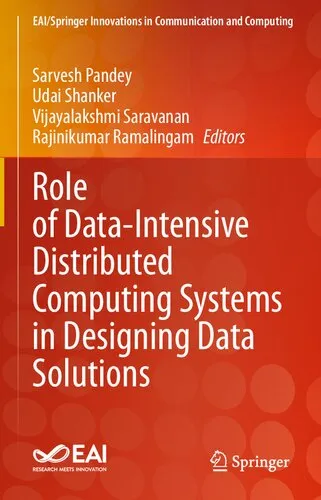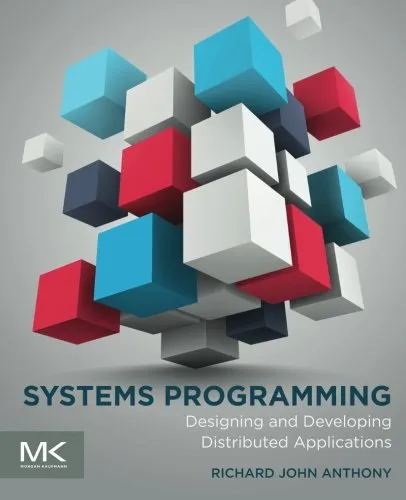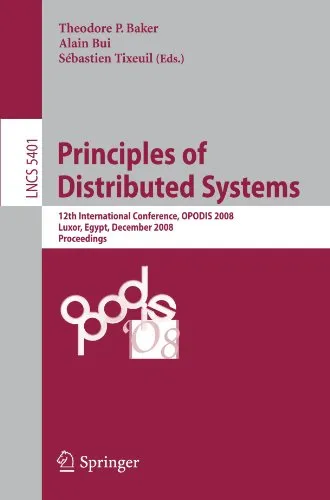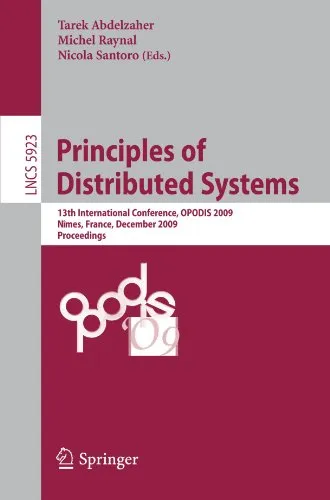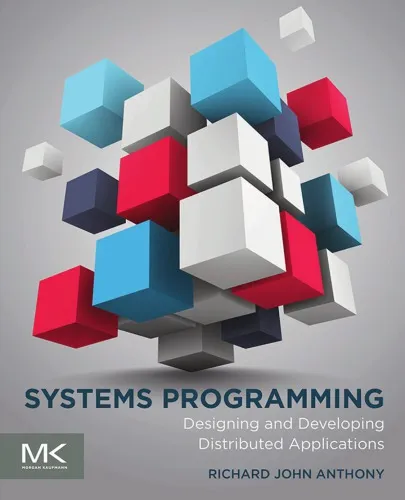Principles of Distributed Systems: 10th International Conference, OPODIS 2006, Bordeaux, France, December 12-15, 2006. Proceedings
4.0
بر اساس نظر کاربران

شما میتونید سوالاتتون در باره کتاب رو از هوش مصنوعیش بعد از ورود بپرسید
هر دانلود یا پرسش از هوش مصنوعی 2 امتیاز لازم دارد، برای بدست آوردن امتیاز رایگان، به صفحه ی راهنمای امتیازات سر بزنید و یک سری کار ارزشمند انجام بدینکتاب های مرتبط:
معرفی کتاب "Principles of Distributed Systems: 10th International Conference, OPODIS 2006"
کتاب "Principles of Distributed Systems: 10th International Conference, OPODIS 2006" به مستندسازی پژوهشها و دستاوردهای ارائهشده در دهمین کنفرانس بینالمللی OPODIS که در بوردو، فرانسه، در تاریخ 12 تا 15 دسامبر 2006 برگزار شد، میپردازد. این کتاب مجموعهای ارزشمند از مقالات علمی و پژوهشی درباره سیستمهای توزیعشده را شامل میشود و منبعی استثنایی برای دانشجویان، محققان و متخصصان این حوزه به شمار میآید.
خلاصهای از محتوای کتاب
این کتاب شامل تحقیقات پیشرفته در حوزه Distributed Systems بوده و موضوعاتی چون الگوریتمها، پروتکلها، امنیت، سیستمهای تحمل خطا، و قابلیت مقیاسپذیری را بررسی میکند. هدف اصلی این کار پژوهشی، تحلیل مسائل و چالشهای مهم در توسعه سیستمهای توزیعشده است. مقالات موجود در کتاب به سه دسته کلی تقسیم میشوند:
- راهحلهای جدید برای چالشهای شناختهشده در سیستمهای توزیعشده
- روشهای بهینهسازی الگوریتمها و ساختارهای سیستم
- پژوهشهای بنیادین در زمینه مفاهیم جدید و تعاملات سیستمهای توزیعشده
هر مقاله در این کتاب پژوهشهای تئوری و عملی را به گونهای ارائه میدهد که به مخاطب، درک بهتری از چالشها و راهحلهای موجود در این حوزه بدهد.
نکات کلیدی و دستاوردها
- آشنایی با روشهای جدید پیادهسازی پروتکلهای توزیعشده
- بررسی مدلهای امنیتی و قابلیت اعتماد در سیستمهای توزیعشده
- پژوهش در زمینه بهبود عملکرد و کاهش هزینه در معماریهای توزیعشده
- بررسی مقیاسپذیری و پارادایمهای جدید توزیع در شبکهها
این کتاب به بررسی مشکلات عملی و نظری در این حوزه پرداخته و راهکارهای جدید را معرفی میکند. از جمله مسائل بررسیشده میتوان به مسائلی همچون Consensus Algorithms، جایگزینی و پشتیبانی از خطاها (Fault Tolerance) و روشهای مدرن در توزیع داده اشاره کرد.
نقل قولهای مشهور از کتاب
"The complexity of distributed systems lies in their inherently asynchronous and autonomous components."
"Fault tolerance is the ability of a system to sustain functionality in the face of failure."
چرا این کتاب اهمیت دارد؟
کتاب "Principles of Distributed Systems: 10th International Conference, OPODIS 2006" به دلیل گردآوری پژوهشهای برتر از برترین متخصصان و ارائه سخنرانیهای علمی در این حوزه، اهمیت ویژهای دارد. دلایل اصلی برای اهمیت این کتاب عبارتند از:
- پیوند نظریه و عمل: مقالات موجود در این کتاب نه تنها به نظریههای توزیع سیستمها پرداخته، بلکه به مشکلات واقعی طراحی و توسعه نیز توجه دارند.
- رویکرد میانرشتهای: این کتاب موضوعاتی چون علوم رایانه، امنیت، و مهندسی نرمافزار را به هم پیوند میدهد.
- بهروزرسانی دانش متخصصان: با خواندن این کتاب، متخصصان سیستمهای توزیعشده میتوانند با جدیدترین پژوهشهای جهانی آشنا شوند.
این کتاب نه تنها استنادهای فراوانی در مقالات آکادمیک دارد، بلکه به عنوان منبع آموزشی در دانشگاهها و موسسات تحقیقاتی مورد استفاده قرار گرفته است.
Introduction to the Book
"Principles of Distributed Systems: 10th International Conference, OPODIS 2006, Bordeaux, France, December 12-15, 2006. Proceedings" is a comprehensive collection of research presented during the 10th edition of the OPODIS conference. It explores key concepts, problems, and solutions in the domain of distributed systems—an essential area of computer science concerning systems that span across multiple interconnected computers. This book brings together a wealth of innovative ideas and breakthrough findings that drive the field of distributed systems forward, offering insight into both theory and practice.
The OPODIS conference series provides a distinguished platform for international researchers, practitioners, and academics to exchange ideas and unveil new findings in distributed systems and related domains. This book serves as the official proceedings of the 2006 conference, containing peer-reviewed papers that represent cutting-edge advancements. Topics range from network algorithms, fault tolerance, security, and synchronization to emerging trends like peer-to-peer systems and mobile computing. The content of this book is relevant for graduate students, researchers, system designers, and IT professionals looking to deepen their knowledge of distributed systems.
Detailed Summary
This book delves into innovative solutions and methodologies essential for the design and implementation of distributed systems. Compiling the prestigious research presented at OPODIS 2006, the proceedings tackle a range of challenges that arise when designing and analyzing distributed environments. By focusing on diverse aspects of distributed systems—algorithms, scalability, fault tolerance, and security—this book offers a multifaceted understanding of the field.
The papers span theoretical foundations and applied technologies, making it a unique resource. Specific topics include the effectiveness of distributed algorithms, the intricacies of consensus protocols, clock synchronization mechanisms, and secure communication in distributed settings. With rapid advancements in technology, exploring mobile and peer-to-peer systems is also a highlight. Readers can expect a meticulous treatment of efficiency, reliability, and robustness—qualities that are central to distributed computing.
Key Takeaways
- Comprehensive exploration of distributed algorithms and their practical applications.
- Insights into overcoming challenges such as fault tolerance, dynamic network changes, and security threats.
- Essential discussions on synchronization primitives and consensus protocols vital for distributed environments.
- Introduction to emerging themes like mobile computing, peer-to-peer systems, and scalability in distributed systems.
- A blend of theoretical advancements and practical insights, offering value to researchers and practitioners alike.
Famous Quotes from the Book
The proceedings contain thought-provoking and impactful statements from leading researchers that encapsulate the importance and challenges of distributed systems. Below are a few memorable quotes:
"In distributed systems, achieving agreement across unreliable nodes is not merely a problem—it's a paradox we choose to solve."
"Fault tolerance isn't just about redundancy; it's about anticipating failure as an inevitable part of any complex system."
Why This Book Matters
As distributed systems continue to underpin modern digital infrastructure, their complexity and significance escalate correspondingly. From powering cloud computing to enabling large-scale data processing and real-time collaboration tools, distributed systems are the backbone of technological progress. This book is a vital resource for those aiming to understand and innovate within this dynamic field.
With groundbreaking research from esteemed contributors, the OPODIS 2006 proceedings foster an environment of academic excellence and practical problem-solving. Whether you are a student seeking foundational knowledge, a researcher pursuing new insights, or an industry professional tackling practical distributed computing challenges, this book equips you with the tools and knowledge needed to succeed. Furthermore, as it features a wide range of topics, this book highlights the interdisciplinary nature of distributed systems, connecting theory, application, and future directions.
Ultimately, this book serves to not just inform but also inspire readers to contribute to the field of distributed computing, making it a cornerstone reference for the community.
دانلود رایگان مستقیم
شما میتونید سوالاتتون در باره کتاب رو از هوش مصنوعیش بعد از ورود بپرسید
دسترسی به کتابها از طریق پلتفرمهای قانونی و کتابخانههای عمومی نه تنها از حقوق نویسندگان و ناشران حمایت میکند، بلکه به پایداری فرهنگ کتابخوانی نیز کمک میرساند. پیش از دانلود، لحظهای به بررسی این گزینهها فکر کنید.
این کتاب رو در پلتفرم های دیگه ببینید
WorldCat به شما کمک میکنه تا کتاب ها رو در کتابخانه های سراسر دنیا پیدا کنید
امتیازها، نظرات تخصصی و صحبت ها درباره کتاب را در Goodreads ببینید
کتابهای کمیاب یا دست دوم را در AbeBooks پیدا کنید و بخرید
1317
بازدید4.0
امتیاز0
نظر98%
رضایتنظرات:
4.0
بر اساس 0 نظر کاربران
Questions & Answers
Ask questions about this book or help others by answering
No questions yet. Be the first to ask!


